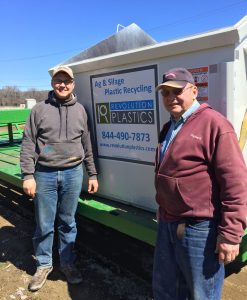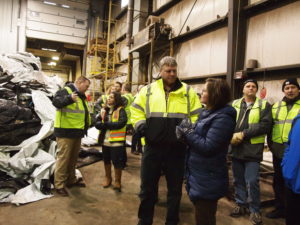New in 2020! Explore this map tool to find ag plastic recycling resources in your area
Find your local recycling expert here: Ag Plastic Recycling Contact Information
Recycle these film plastics only:

Do NOT recycle these:
Contamination caused this recycling program to shut down before. Please follow the guidelines. If it isn’t on the list of what you can recycle: Don’t put it in the bag or dumpster.
Throughout Minnesota in fields and at farm-sites, it is now commonplace to see agricultural feed stocks such as hay and silage, stored in long, undulating rows of white plastic or in bunkers covered in white plastic, often held in place by tires. Marinas and other locations around the state, feature storage lots filled with boats covered in bright blue or white plastic shrink film covers. Round or square bales of hay are wrapped in a plastic netting or use plastic twine.

Still other plastics are used to mulch fruits and vegetables in the fields, to cover the greenhouses/ hoop houses, as tubing for maple sap collection and irrigation and the nursery containers with which most gardeners and landscapers are familiar. These plastics help farmers cut costs, better preserve their harvests and help address the need for temporary storage of grain and other products, while the shrink film covers provide valuable protection for boats, extending the life of the boats which can save on resources needed to produce new watercraft.
With the exception of pesticide and sanitizer containers managed through waste pesticide container programs, the options for farmers in recycling these used plastics are not well developed if they exist at all. While some of these plastics are landfilled, unfortunately, much of it has been burned in the field, generating dioxins and other pollutants, or dumped in some out of the way place on the farm.
RAM and its many partners in the solid waste, recycling, agricultural and manufacturing sectors are joining forces to address this challenge. The Recycling Association of Minnesota has begun an initiative to bring solid waste and recycling professionals together with the agricultural and boating communities, agencies and suppliers to begin discussion and formulate a plan of action to address the challenge of proper management and recycling of waste plastic film materials.

RAM’s Role:
• Work with partners to identify and develop markets for the plastic material
• Encourage development of equipment for cleaning and processing the collected material
• Assist with collection strategies
• Facilitate educational initiatives and opportunities
• Organize and coordinate efforts in Minnesota with those in neighboring states
Plastic products and packaging have become an integral part of all aspects of farming and are a valuable, energy-rich and recoverable material we should recover, not landfill or burn in the field.
Agricultural Plastic in the News

